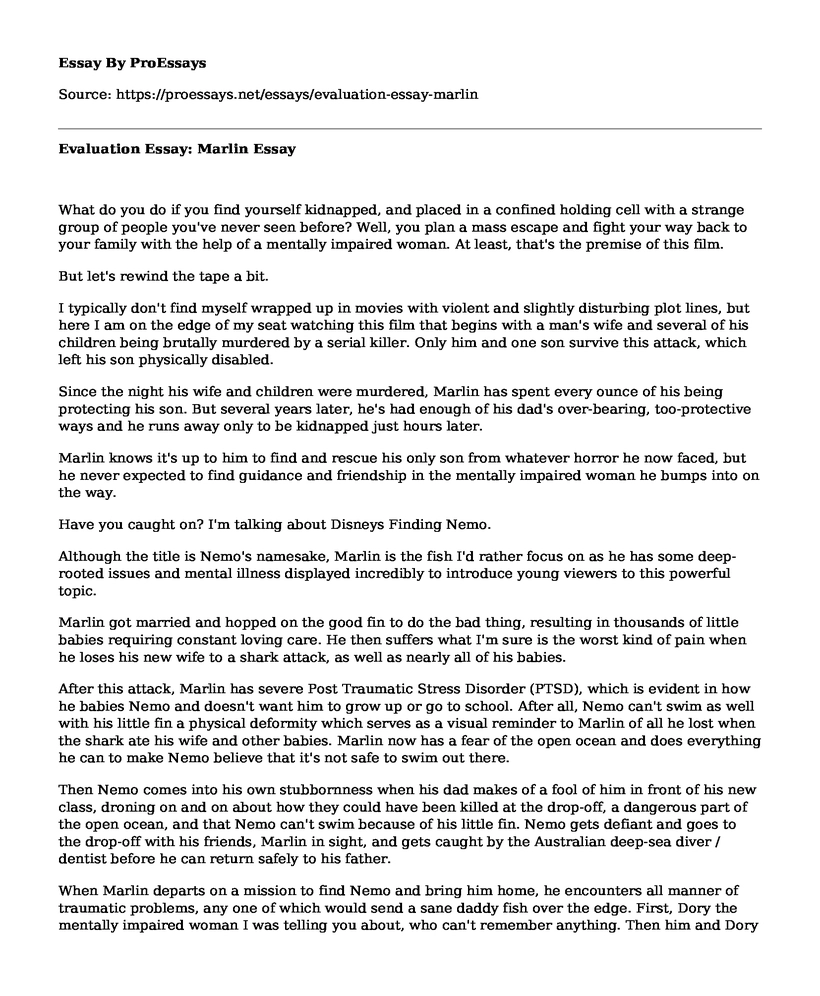What do you do if you find yourself kidnapped, and placed in a confined holding cell with a strange group of people you've never seen before? Well, you plan a mass escape and fight your way back to your family with the help of a mentally impaired woman. At least, that's the premise of this film.
But let's rewind the tape a bit.
I typically don't find myself wrapped up in movies with violent and slightly disturbing plot lines, but here I am on the edge of my seat watching this film that begins with a man's wife and several of his children being brutally murdered by a serial killer. Only him and one son survive this attack, which left his son physically disabled.
Since the night his wife and children were murdered, Marlin has spent every ounce of his being protecting his son. But several years later, he's had enough of his dad's over-bearing, too-protective ways and he runs away only to be kidnapped just hours later.
Marlin knows it's up to him to find and rescue his only son from whatever horror he now faced, but he never expected to find guidance and friendship in the mentally impaired woman he bumps into on the way.
Have you caught on? I'm talking about Disneys Finding Nemo.
Although the title is Nemo's namesake, Marlin is the fish I'd rather focus on as he has some deep-rooted issues and mental illness displayed incredibly to introduce young viewers to this powerful topic.
Marlin got married and hopped on the good fin to do the bad thing, resulting in thousands of little babies requiring constant loving care. He then suffers what I'm sure is the worst kind of pain when he loses his new wife to a shark attack, as well as nearly all of his babies.
After this attack, Marlin has severe Post Traumatic Stress Disorder (PTSD), which is evident in how he babies Nemo and doesn't want him to grow up or go to school. After all, Nemo can't swim as well with his little fin a physical deformity which serves as a visual reminder to Marlin of all he lost when the shark ate his wife and other babies. Marlin now has a fear of the open ocean and does everything he can to make Nemo believe that it's not safe to swim out there.
Then Nemo comes into his own stubbornness when his dad makes of a fool of him in front of his new class, droning on and on about how they could have been killed at the drop-off, a dangerous part of the open ocean, and that Nemo can't swim because of his little fin. Nemo gets defiant and goes to the drop-off with his friends, Marlin in sight, and gets caught by the Australian deep-sea diver / dentist before he can return safely to his father.
When Marlin departs on a mission to find Nemo and bring him home, he encounters all manner of traumatic problems, any one of which would send a sane daddy fish over the edge. First, Dory the mentally impaired woman I was telling you about, who can't remember anything. Then him and Dory are corralled into a support group meeting for sharks in recovery from eating fish; their motto: Fish are Friends, Not Food. I can only imagine the raw terror Marlin felt after losing his wife and children to a shark and then having a large, Great White named Bruce chase him down, intent on taking just a little bite. After the out-run the sharks, they have a jellyfish problem and get swallowed by a whale, then have to jump into the mouth of a friendly pelican to avoid being eaten by seagulls, and all this to see little Nemo belly-side up in a plastic bag pretending to be dead.
Now Marlin battles depression who wouldn't be depressed after all of that? But to be reunited with his thought-to-be-dead son brings out the fierce protective part of Marlin once again. He doesn't want Nemo to do anything to endanger himself or put himself out farther than Marlin thinks is appropriate.
Then the last upheaval happens the part where Nemo is small enough to swim through the fight net, where Dory and thousands of other fish are trapped, to encourage and motivate the group to swim down as a way to fight against being taken away by the net something Nemo knows frighteningly too well. Marlin has to make the decision to let Nemo go once again.
It's a kids movie, after all, so it has to end well. But Marlin was forced to come to a healthier decision about how to parent Nemo, which leaves both Nemo and Marlin happier as well. He's beat his mental illness, for the sake of the movie, anyway. In reality, this wouldn't be the case. But who are we to try to fight against the willful tenacity of a father with everything to lose? Perhaps it's a lesson of the power of the mind over mental illness.
Cite this page
Evaluation Essay: Marlin. (2021, Mar 13). Retrieved from https://proessays.net/essays/evaluation-essay-marlin
If you are the original author of this essay and no longer wish to have it published on the ProEssays website, please click below to request its removal:
- Compare and Contrast Essay on Counseling Theories
- Essay Sample on Love, Sex and Desire in French Cinema and Literature
- Identifying the Cause Negative Behavior - Essay Sample
- Essay Sample on Tapping Into Technology: Examining Social Media & Advanced Hardware
- Mental Health Disorders: A Social Burden on Patients and Relatives - Research Proposal
- Essay Example on a Passage to Hindustani Classical Music: An Ode to Ravi Shankar and Philip Glass
- Free Essay Example on Thorndike's Law of Effect: Stimuli-Response & Reinforcement







